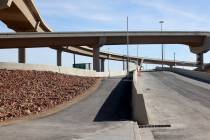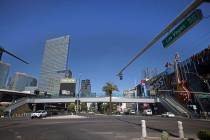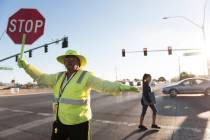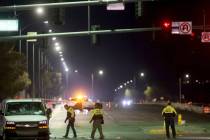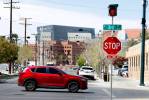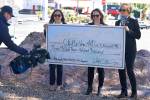Defensive driving eases road rage
The response was overwhelmingly supportive.
Last Sunday's column about my experience with road rage earlier this year generated a healthy response from readers - emails, phone calls and comments appended to the online version of the account.
Some commiserated by sharing their own tales of terror - several more harrowing than mine - while others told me not to feel guilty about briefly feeding into the crazed anger of an impatient motorist.
More than a few readers recommended I take advantage of my Second Amendment right to own a gun.
One astute caller even questioned my intelligence for recounting the ugly confrontation as I headed to my northwest valley home that night, saying all I was doing was stoking the individual - if he read the column or was told about it - to hunt me down at work. "Why invite a second incident?" I was asked.
The point of the column wasn't to solicit sympathy, although it was appreciated, and certainly not to bring me face to face again with my antagonist. The point was to educate all motorists that, even when you're in the right, a flash of retaliation - an all-too-human response - can draw you into the wrong.
The best way to combat road rage is through "defensive driving." Never is that practice more important than this time of year, as motorists hit the highways and byways for the Thanksgiving holiday followed by four frenzied weeks of Christmas shopping, which annually turns city streets and shopping mall parking lots into Petri dishes of impatience, frustration, anger and occasional violence.
In a "Me first!" world, thinking "Me safe first!" rarely prevails.
But it must.
We've all heard the advice, so it's nothing new for me to tell you to give yourself extra time to get to where you need to go. Or to show courtesy to other motorists, especially those not inclined to do so themselves. Or to take a deep breath and count to 10 when you feel violated.
We also know we shouldn't get behind the wheel when we're stressed. But life doesn't work in absolutes, does it?
As Nevada Highway Patrol trooper Jeremie Elliott and Metropolitan Police Department officer Marcus Martin told me this past week, almost using the same words: There will always be road rage; all we can do is make a conscious effort to reduce it through our own defensive driving.
"It takes a conscious effort to make a change, to make a fundamental change," Elliott said, conceding that even he, in his private life, gets frustrated by overzealous drivers. "You have to make a conscious effort to drive defensively, and hopefully you'll pass it along to other drivers."
While hard statistics are not available, partly because much of it goes unreported, road rage "is on the rise, and it's been a phenomenon in our society for some time," Martin said. "We've seen quite a bit of it here for a while."
One of the contributing factors in Southern Nevada is that we're an amalgamation of transplants who bring with us different driving approaches - aggressive, passive; rushed, leisurely; hypervigilant, hypersensitive, easily distracted. More often than not, we don't know which types we have in the vehicle in front, behind and alongside of us until we've seen them drive for a while. Then it can be too late.
Thus, it becomes incumbent upon us, as much as we have to grit our teeth to do so, to be the bigger person by being the lesser threat.
To wit: Use the passing lane for passing only. Don't tailgate slower drivers. Don't speed. Use your signal indicator well in advance of a turn or a lane change. Let assertive drivers merge in front of you, even if the law says they should merge behind you.
To a lesser extent, listen to music that makes you happy. Chew gum to cut the stress. Shrug off drivers around you who still don't get it that it's better to get to a destination a little late than to not get there at all because a road rage incident escalated into an accident or outright violence.
"Although manners are pretty much breathing their last breath in our society, it's good to remember to use basic manners when driving," Martin advised. "And in those instances when basic manners aren't returned in kind, you have to ask yourself if it's really all that important to prove you're right, even when you are right."
Admittedly, that concept goes against human nature. Isn't it always about being right? About having the upper hand in any given situation?
Not when you settle into the driver's seat of your vehicle, the Highway Patrol's Elliott said. After you buckle up and before you start the ignition, take a moment to understand and appreciate what your presence on the road means - not just to yourself and your passengers, but to other drivers as well.
"I can preach all day long, give out tickets all day long, but until we make a conscious effort to change - every one of us - it's not going to get better," Elliott said.
If not for your own sake, then for the sake of someone you love, make that change now.
Drive defensively. Eliminate road rage.
Questions and comments should be sent to roadwarrior@reviewjournal.com. Please include your phone number. Follow the Road Warrior on Twitter: @RJroadwarrior.
■ Lane closures at Las Vegas Boulevard and Flamingo Road from 2 a.m. to 10 a.m. Monday through Wednesday for manhole rehabilitation work.
■ Lane closures on Lone Mountain Road, between Rancho Drive and Decatur Boulevard, through January for roadway improvements.
■ Lane restrictions in both directions of Decatur Boulevard, between Lake Mead Boulevard and Rancho Drive, through Nov. 30 for paving and median island improvements.
■ Lane restrictions on southbound Decatur Boulevard, between Cheyenne Avenue and Lone Mountain Road, through Dec. 7 for roadway improvements.
■ Closure of Buffalo Drive, between Russell Road and Patrick Lane, through Dec. 24 for construction of an enclosed flood-control channel.
Lane closures for Water Reclamation District surveys:
■ Nellis Boulevard, from Hayward to San Rafael avenues, through Wednesday.
■ Paradise Road, from Royal Moon Avenue to Robindale Road, through Friday.
■ Eastern Avenue, from Robindale Road to El Dorado Lane, through Friday.
■ Flamingo Road, from Nellis Boulevard to Perry Street, through Friday.
■ Mountain Vista Street, north of the Interstate 515 underpass at Hacienda Avenue, through Friday.
■ Nellis Boulevard, from Hacienda Avenue to Tropicana Avenue, through Friday.
■ Sunset Road, from Eastern Avenue to McLeod Drive, through Friday.
■ Wigwam Avenue at Las Vegas Boulevard through Dec. 31.
■ Valley View Boulevard, north of Ford Avenue, through Dec. 31.
■ Valley View Boulevard, north of Pebble Road, through Dec. 31.
GASOLINE PRICES
The average price of gasoline Friday in the Las Vegas Valley was $3.60 per gallon; the state average was $3.62; the national average was $3.45.
LAS VEGAS REVIEW-JOURNAL














